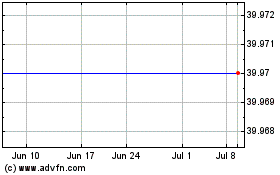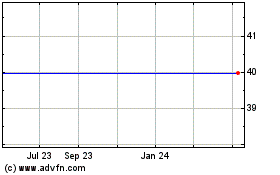JPMorgan To Offer Free Trading for Bank Customers -- 2nd Update
August 21 2018 - 6:51PM
Dow Jones News
By Emily Glazer and Lisa Beilfuss
JPMorgan Chase & Co. is boosting its digital investing
service with free trades for customers in a move that sent the
world of online brokerages into disarray Tuesday.
The bank is trying to bring in more first-time investors,
including millennials, as well as customers of the bank who invest
elsewhere. JPMorgan's move could accelerate the pricing war
buffeting rivals such as TD Ameritrade Holding Corp. and Charles
Schwab Corp., which have been cutting fees in a fierce competition
for customers. Fintech startups offering low-fee or discounted
trading have accelerated that competition.
Shares of TD Ameritrade, Schwab and E*Trade Financial Corp.
tumbled on the news, with TD Ameritrade falling more than 7%.
The JPMorgan service will offer any bank customer at least 100
free stock or exchange-traded-fund trades for a year, with no
account minimums, said bank spokesman Darin Oduyoye. That is a sea
change in pricing. The bank had charged $24.95 for online trades as
recently as last year, according to CNBC, which reported the news
earlier. The service, dubbed You Invest Trade, will be embedded in
the bank's app and website.
Schwab charges $4.95 a trade, and TD Ameritrade and E*Trade
charge $6.95, according to their websites. Bank of America Corp.
launched Merrill Edge, its lower-cost online brokerage platform, in
2010. It costs $6.95 a trade, with certain trades free for clients
with balances of at least $20,000.
At JPMorgan, many customers will be charged $2.95 per trade if
they exceed the 100 trades in the first year. However, certain
wealthier bank customers will be eligible for 100 free trades each
year or unlimited free trading, Mr. Oduyoye said.
JPMorgan Chief Financial Officer Marianne Lake said in February
that the bank had recognized it wasn't competitive in digital
investments. It announced a $300 million investment into digital
wealth management two years ago to "accelerate our ability to
capture more...investments," she said.
Devin Ryan, an analyst at JMP Securities, said the move signals
that the brokerage industry is willing to push pricing lower.
"Ultimately we will end up at zero," he said.
The question, Mr. Ryan said, is what happens in between. Firms
offer trading discounts to bring in customers who sometimes become
more lucrative clients if they take advantage of other services,
such as investment advice or margin loans. The race to zero is
putting pressure on firms to differentiate their businesses and
make more money on the clients they woo with low or no trading
fees.
At Schwab, which has a more diversified business that includes
wealth-management services and a banking arm, trading commissions
now make up just 7% of total revenue. Schwab and TD Ameritrade,
which once focused mainly on day traders looking to inexpensively
manage their own money, now also cater to independent financial
advisers who need a place to house client assets. By doing so, the
online brokerages have reinvigorated a business that was hit by the
tech-stock bust at the beginning of the century and the 2008
financial crisis.
An offer like JPMorgan's is meant to appeal to everyday
investors managing their own money, said Denise Valentine, an
analyst at research firm Aite Group. "It captures their attention
and once you hook them, you have the opportunity to keep them."
After sitting out most of the nine-year bull run, individual
investors started pouring in at the end of last year. Schwab, TD
Ameritrade and other online brokerages reported surges in trading
activity that carried into 2018, and they attributed much of the
activity to individual investors who opened brokerage accounts for
the first time.
After the JPMorgan announcement, Schwab said in a statement it
"will continue to aggressively lead the way in improving how people
invest and manage their wealth." A TD Ameritrade spokeswoman said
the company "continually evaluates its offerings and pricing" and
"will remain nimble."
Schwab, the biggest e-broker, reported 11.2 million active
brokerage accounts at the end of the second quarter and said
clients executed an average of 704,000 trades a day. That amounts
to roughly 45 million trades and an average of about four trades
per client account during the quarter.
Schwab and TD Ameritrade have seen lower revenue per trade as
pricing pressure heats up. At Schwab, average revenue per revenue
trade (which excludes certain transactions) fell to $7.30 in the
latest quarter from $7.96 a year earlier. For TD Ameritrade, that
metric dropped to $7.40 from $7.83 in last year's quarter. But
lower prices have been offset by higher activity, with both firms
posting solid increases in overall revenue.
JPMorgan, which has hinted at the new service in prior investor
presentations, also plans to launch a type of robo-investing
service embedded in its app and website called You Invest
Portfolios to assist customers with investing.
Write to Emily Glazer at emily.glazer@wsj.com and Lisa Beilfuss
at lisa.beilfuss@wsj.com
(END) Dow Jones Newswires
August 21, 2018 18:36 ET (22:36 GMT)
Copyright (c) 2018 Dow Jones & Company, Inc.
TD Ameritrade (NASDAQ:AMTD)
Historical Stock Chart
From Mar 2024 to Apr 2024

TD Ameritrade (NASDAQ:AMTD)
Historical Stock Chart
From Apr 2023 to Apr 2024
